University Presentation: Global Mental Health Issues and Challenges
VerifiedAdded on 2023/04/20
|7
|1579
|243
Presentation
AI Summary
This presentation explores global mental health as a significant public health concern, highlighting its contribution to the global burden of disease. It examines the prevalence of mental disorders, particularly in low- and middle-income countries (LMICs), and the impact of social, economic, and political factors. The presentation delves into the influence of globalization, unemployment, social policies, and environmental factors on mental health. It also discusses the role of neoliberalism and the implementation of Sustainable Development Goals to address these issues, emphasizing the need for interventions and collaboration to promote mental well-being globally. The presentation references key literature and provides insights into health inequalities and the social determinants affecting mental health outcomes.

Running head: GLOBAL MENTAL HEALTH ISSUES
Name of the Student:
Name of the University:
Author note:
Name of the Student:
Name of the University:
Author note:
Paraphrase This Document
Need a fresh take? Get an instant paraphrase of this document with our AI Paraphraser
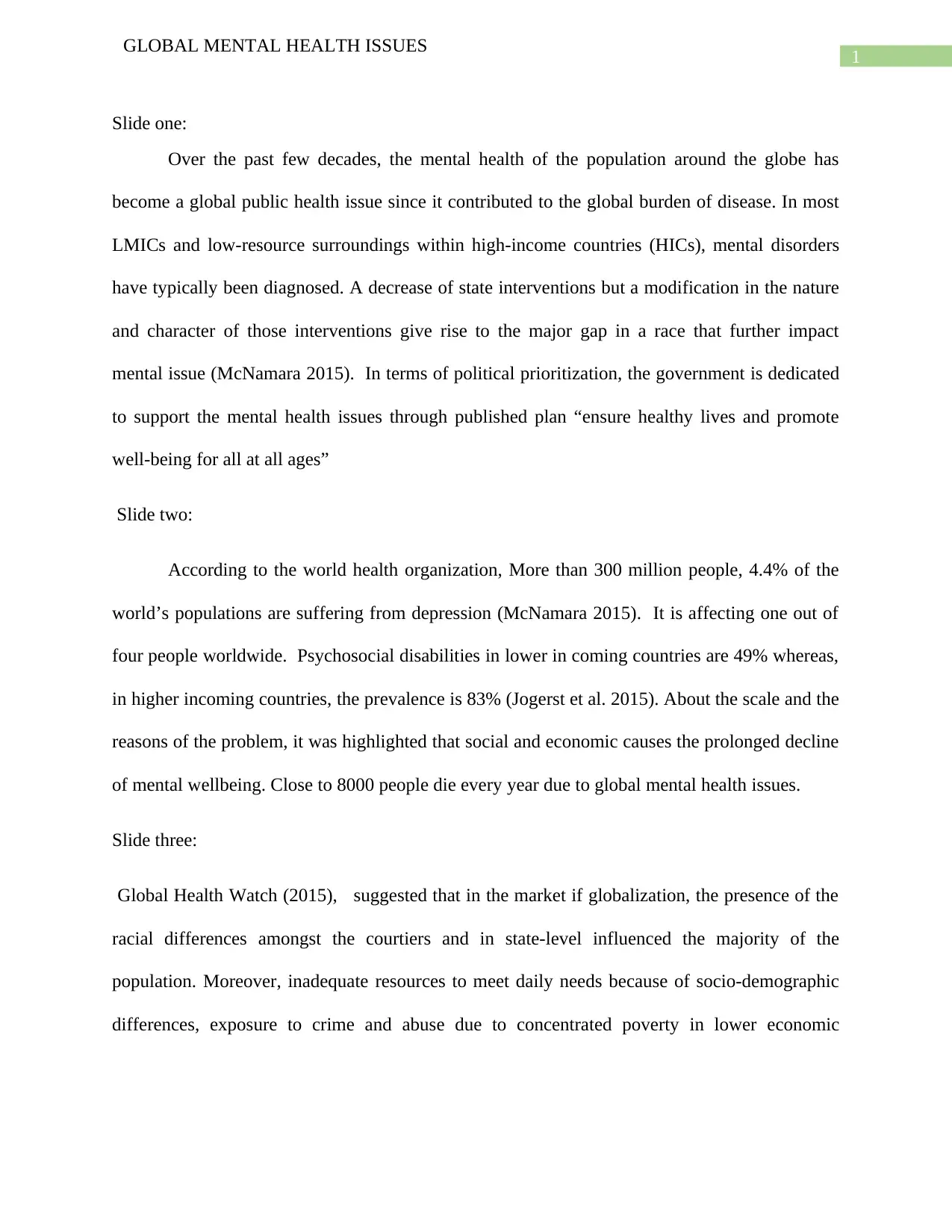
1
GLOBAL MENTAL HEALTH ISSUES
Slide one:
Over the past few decades, the mental health of the population around the globe has
become a global public health issue since it contributed to the global burden of disease. In most
LMICs and low-resource surroundings within high-income countries (HICs), mental disorders
have typically been diagnosed. A decrease of state interventions but a modification in the nature
and character of those interventions give rise to the major gap in a race that further impact
mental issue (McNamara 2015). In terms of political prioritization, the government is dedicated
to support the mental health issues through published plan “ensure healthy lives and promote
well-being for all at all ages”
Slide two:
According to the world health organization, More than 300 million people, 4.4% of the
world’s populations are suffering from depression (McNamara 2015). It is affecting one out of
four people worldwide. Psychosocial disabilities in lower in coming countries are 49% whereas,
in higher incoming countries, the prevalence is 83% (Jogerst et al. 2015). About the scale and the
reasons of the problem, it was highlighted that social and economic causes the prolonged decline
of mental wellbeing. Close to 8000 people die every year due to global mental health issues.
Slide three:
Global Health Watch (2015), suggested that in the market if globalization, the presence of the
racial differences amongst the courtiers and in state-level influenced the majority of the
population. Moreover, inadequate resources to meet daily needs because of socio-demographic
differences, exposure to crime and abuse due to concentrated poverty in lower economic
GLOBAL MENTAL HEALTH ISSUES
Slide one:
Over the past few decades, the mental health of the population around the globe has
become a global public health issue since it contributed to the global burden of disease. In most
LMICs and low-resource surroundings within high-income countries (HICs), mental disorders
have typically been diagnosed. A decrease of state interventions but a modification in the nature
and character of those interventions give rise to the major gap in a race that further impact
mental issue (McNamara 2015). In terms of political prioritization, the government is dedicated
to support the mental health issues through published plan “ensure healthy lives and promote
well-being for all at all ages”
Slide two:
According to the world health organization, More than 300 million people, 4.4% of the
world’s populations are suffering from depression (McNamara 2015). It is affecting one out of
four people worldwide. Psychosocial disabilities in lower in coming countries are 49% whereas,
in higher incoming countries, the prevalence is 83% (Jogerst et al. 2015). About the scale and the
reasons of the problem, it was highlighted that social and economic causes the prolonged decline
of mental wellbeing. Close to 8000 people die every year due to global mental health issues.
Slide three:
Global Health Watch (2015), suggested that in the market if globalization, the presence of the
racial differences amongst the courtiers and in state-level influenced the majority of the
population. Moreover, inadequate resources to meet daily needs because of socio-demographic
differences, exposure to crime and abuse due to concentrated poverty in lower economic
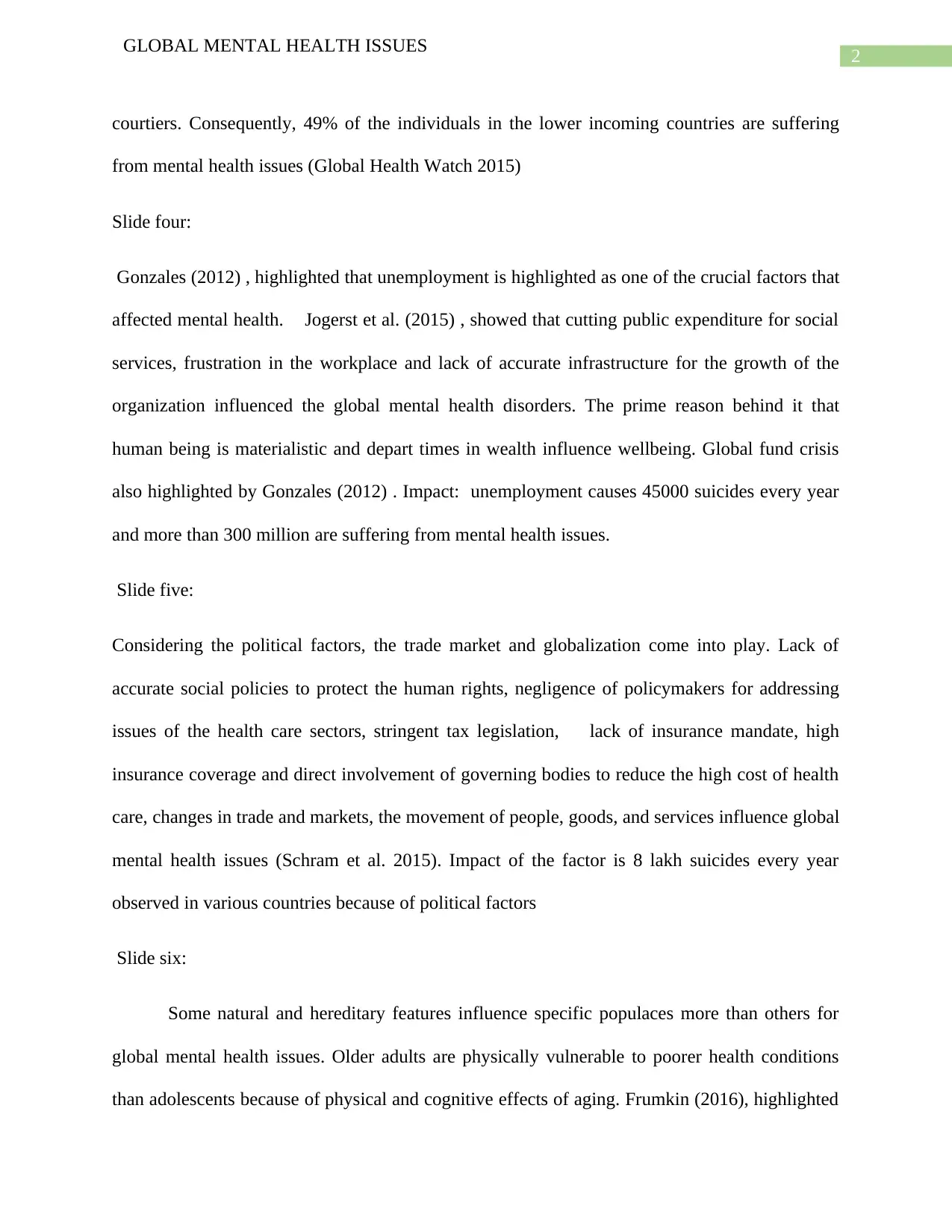
2
GLOBAL MENTAL HEALTH ISSUES
courtiers. Consequently, 49% of the individuals in the lower incoming countries are suffering
from mental health issues (Global Health Watch 2015)
Slide four:
Gonzales (2012) , highlighted that unemployment is highlighted as one of the crucial factors that
affected mental health. Jogerst et al. (2015) , showed that cutting public expenditure for social
services, frustration in the workplace and lack of accurate infrastructure for the growth of the
organization influenced the global mental health disorders. The prime reason behind it that
human being is materialistic and depart times in wealth influence wellbeing. Global fund crisis
also highlighted by Gonzales (2012) . Impact: unemployment causes 45000 suicides every year
and more than 300 million are suffering from mental health issues.
Slide five:
Considering the political factors, the trade market and globalization come into play. Lack of
accurate social policies to protect the human rights, negligence of policymakers for addressing
issues of the health care sectors, stringent tax legislation, lack of insurance mandate, high
insurance coverage and direct involvement of governing bodies to reduce the high cost of health
care, changes in trade and markets, the movement of people, goods, and services influence global
mental health issues (Schram et al. 2015). Impact of the factor is 8 lakh suicides every year
observed in various countries because of political factors
Slide six:
Some natural and hereditary features influence specific populaces more than others for
global mental health issues. Older adults are physically vulnerable to poorer health conditions
than adolescents because of physical and cognitive effects of aging. Frumkin (2016), highlighted
GLOBAL MENTAL HEALTH ISSUES
courtiers. Consequently, 49% of the individuals in the lower incoming countries are suffering
from mental health issues (Global Health Watch 2015)
Slide four:
Gonzales (2012) , highlighted that unemployment is highlighted as one of the crucial factors that
affected mental health. Jogerst et al. (2015) , showed that cutting public expenditure for social
services, frustration in the workplace and lack of accurate infrastructure for the growth of the
organization influenced the global mental health disorders. The prime reason behind it that
human being is materialistic and depart times in wealth influence wellbeing. Global fund crisis
also highlighted by Gonzales (2012) . Impact: unemployment causes 45000 suicides every year
and more than 300 million are suffering from mental health issues.
Slide five:
Considering the political factors, the trade market and globalization come into play. Lack of
accurate social policies to protect the human rights, negligence of policymakers for addressing
issues of the health care sectors, stringent tax legislation, lack of insurance mandate, high
insurance coverage and direct involvement of governing bodies to reduce the high cost of health
care, changes in trade and markets, the movement of people, goods, and services influence global
mental health issues (Schram et al. 2015). Impact of the factor is 8 lakh suicides every year
observed in various countries because of political factors
Slide six:
Some natural and hereditary features influence specific populaces more than others for
global mental health issues. Older adults are physically vulnerable to poorer health conditions
than adolescents because of physical and cognitive effects of aging. Frumkin (2016), highlighted
⊘ This is a preview!⊘
Do you want full access?
Subscribe today to unlock all pages.

Trusted by 1+ million students worldwide
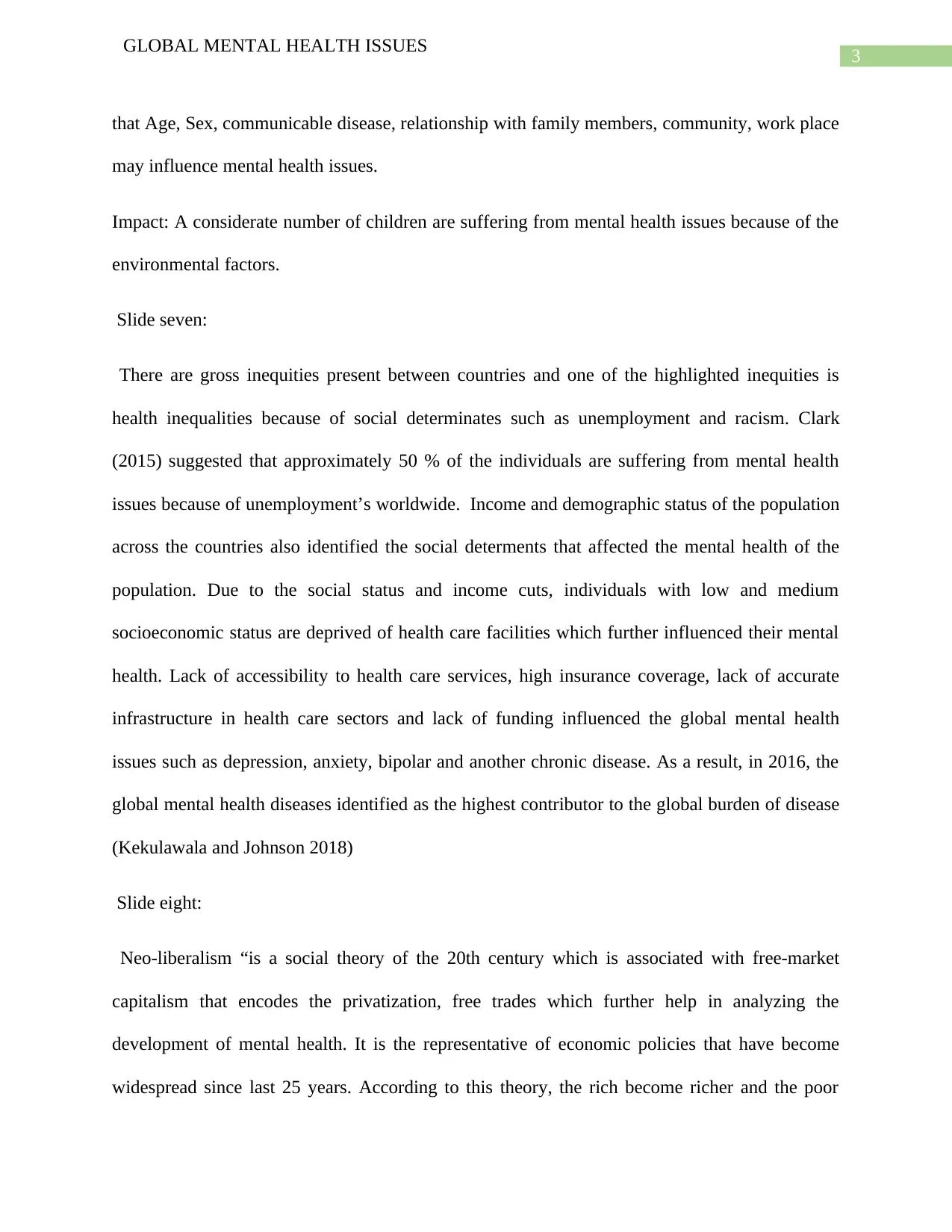
3
GLOBAL MENTAL HEALTH ISSUES
that Age, Sex, communicable disease, relationship with family members, community, work place
may influence mental health issues.
Impact: A considerate number of children are suffering from mental health issues because of the
environmental factors.
Slide seven:
There are gross inequities present between countries and one of the highlighted inequities is
health inequalities because of social determinates such as unemployment and racism. Clark
(2015) suggested that approximately 50 % of the individuals are suffering from mental health
issues because of unemployment’s worldwide. Income and demographic status of the population
across the countries also identified the social determents that affected the mental health of the
population. Due to the social status and income cuts, individuals with low and medium
socioeconomic status are deprived of health care facilities which further influenced their mental
health. Lack of accessibility to health care services, high insurance coverage, lack of accurate
infrastructure in health care sectors and lack of funding influenced the global mental health
issues such as depression, anxiety, bipolar and another chronic disease. As a result, in 2016, the
global mental health diseases identified as the highest contributor to the global burden of disease
(Kekulawala and Johnson 2018)
Slide eight:
Neo-liberalism “is a social theory of the 20th century which is associated with free-market
capitalism that encodes the privatization, free trades which further help in analyzing the
development of mental health. It is the representative of economic policies that have become
widespread since last 25 years. According to this theory, the rich become richer and the poor
GLOBAL MENTAL HEALTH ISSUES
that Age, Sex, communicable disease, relationship with family members, community, work place
may influence mental health issues.
Impact: A considerate number of children are suffering from mental health issues because of the
environmental factors.
Slide seven:
There are gross inequities present between countries and one of the highlighted inequities is
health inequalities because of social determinates such as unemployment and racism. Clark
(2015) suggested that approximately 50 % of the individuals are suffering from mental health
issues because of unemployment’s worldwide. Income and demographic status of the population
across the countries also identified the social determents that affected the mental health of the
population. Due to the social status and income cuts, individuals with low and medium
socioeconomic status are deprived of health care facilities which further influenced their mental
health. Lack of accessibility to health care services, high insurance coverage, lack of accurate
infrastructure in health care sectors and lack of funding influenced the global mental health
issues such as depression, anxiety, bipolar and another chronic disease. As a result, in 2016, the
global mental health diseases identified as the highest contributor to the global burden of disease
(Kekulawala and Johnson 2018)
Slide eight:
Neo-liberalism “is a social theory of the 20th century which is associated with free-market
capitalism that encodes the privatization, free trades which further help in analyzing the
development of mental health. It is the representative of economic policies that have become
widespread since last 25 years. According to this theory, the rich become richer and the poor
Paraphrase This Document
Need a fresh take? Get an instant paraphrase of this document with our AI Paraphraser
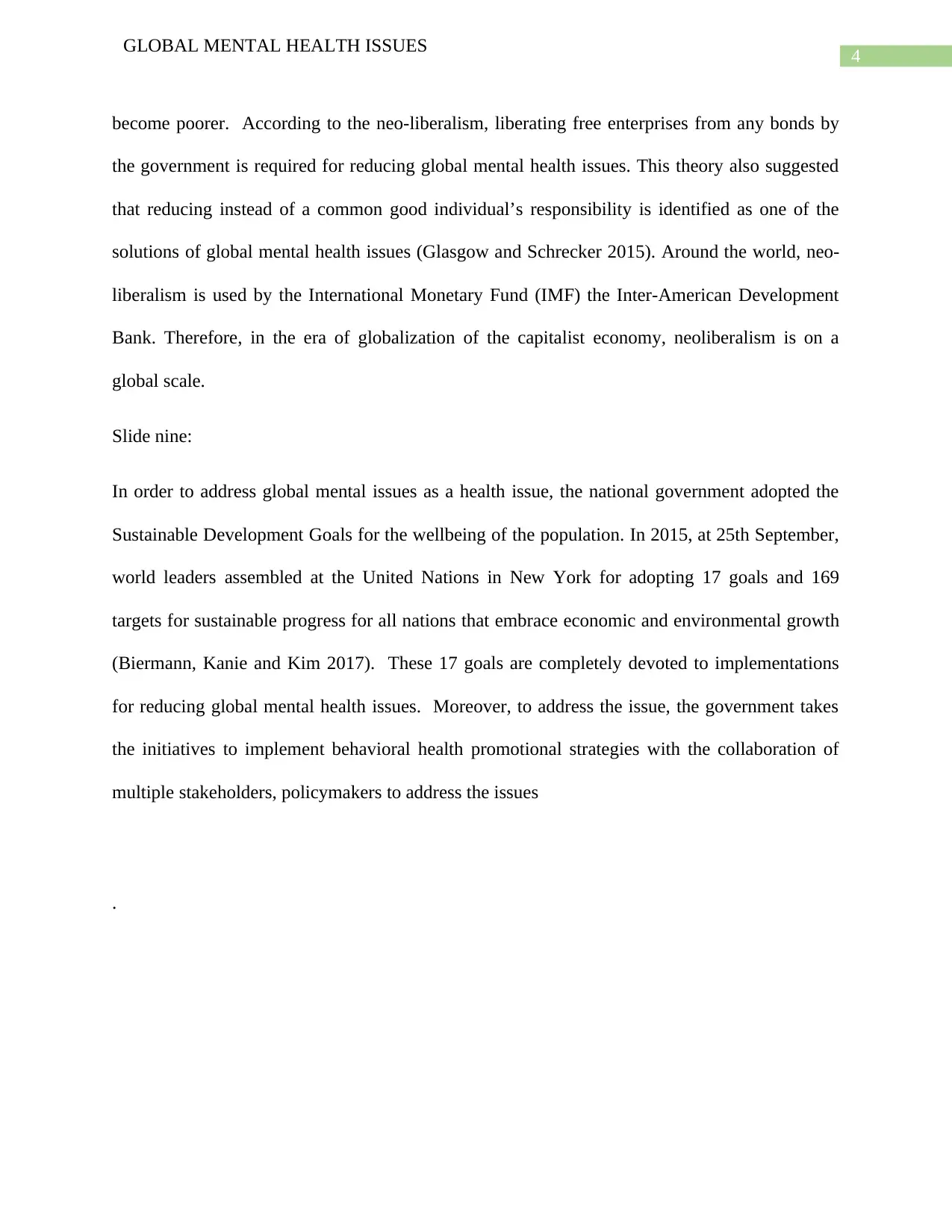
4
GLOBAL MENTAL HEALTH ISSUES
become poorer. According to the neo-liberalism, liberating free enterprises from any bonds by
the government is required for reducing global mental health issues. This theory also suggested
that reducing instead of a common good individual’s responsibility is identified as one of the
solutions of global mental health issues (Glasgow and Schrecker 2015). Around the world, neo-
liberalism is used by the International Monetary Fund (IMF) the Inter-American Development
Bank. Therefore, in the era of globalization of the capitalist economy, neoliberalism is on a
global scale.
Slide nine:
In order to address global mental issues as a health issue, the national government adopted the
Sustainable Development Goals for the wellbeing of the population. In 2015, at 25th September,
world leaders assembled at the United Nations in New York for adopting 17 goals and 169
targets for sustainable progress for all nations that embrace economic and environmental growth
(Biermann, Kanie and Kim 2017). These 17 goals are completely devoted to implementations
for reducing global mental health issues. Moreover, to address the issue, the government takes
the initiatives to implement behavioral health promotional strategies with the collaboration of
multiple stakeholders, policymakers to address the issues
.
GLOBAL MENTAL HEALTH ISSUES
become poorer. According to the neo-liberalism, liberating free enterprises from any bonds by
the government is required for reducing global mental health issues. This theory also suggested
that reducing instead of a common good individual’s responsibility is identified as one of the
solutions of global mental health issues (Glasgow and Schrecker 2015). Around the world, neo-
liberalism is used by the International Monetary Fund (IMF) the Inter-American Development
Bank. Therefore, in the era of globalization of the capitalist economy, neoliberalism is on a
global scale.
Slide nine:
In order to address global mental issues as a health issue, the national government adopted the
Sustainable Development Goals for the wellbeing of the population. In 2015, at 25th September,
world leaders assembled at the United Nations in New York for adopting 17 goals and 169
targets for sustainable progress for all nations that embrace economic and environmental growth
(Biermann, Kanie and Kim 2017). These 17 goals are completely devoted to implementations
for reducing global mental health issues. Moreover, to address the issue, the government takes
the initiatives to implement behavioral health promotional strategies with the collaboration of
multiple stakeholders, policymakers to address the issues
.
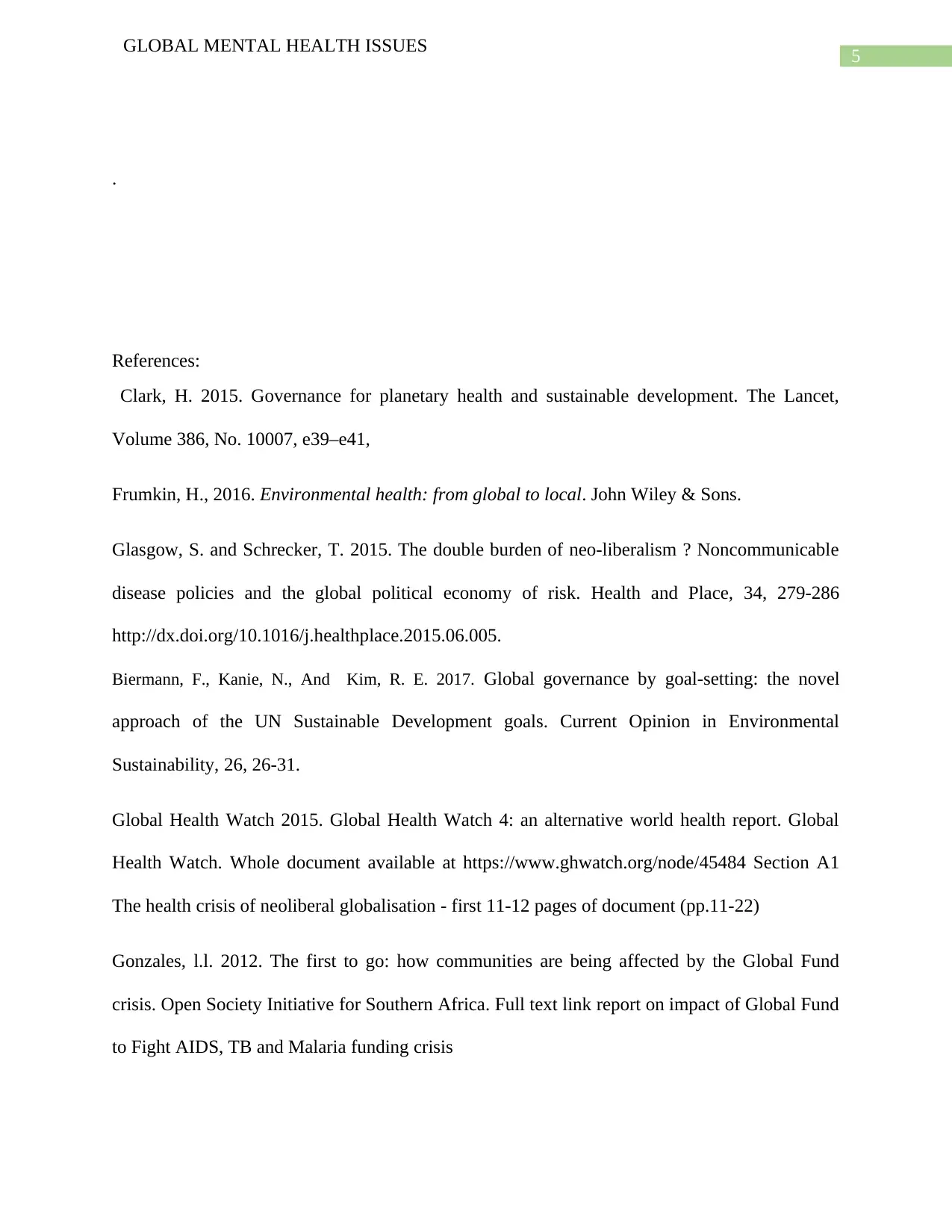
5
GLOBAL MENTAL HEALTH ISSUES
.
References:
Clark, H. 2015. Governance for planetary health and sustainable development. The Lancet,
Volume 386, No. 10007, e39–e41,
Frumkin, H., 2016. Environmental health: from global to local. John Wiley & Sons.
Glasgow, S. and Schrecker, T. 2015. The double burden of neo-liberalism ? Noncommunicable
disease policies and the global political economy of risk. Health and Place, 34, 279-286
http://dx.doi.org/10.1016/j.healthplace.2015.06.005.
Biermann, F., Kanie, N., And Kim, R. E. 2017. Global governance by goal-setting: the novel
approach of the UN Sustainable Development goals. Current Opinion in Environmental
Sustainability, 26, 26-31.
Global Health Watch 2015. Global Health Watch 4: an alternative world health report. Global
Health Watch. Whole document available at https://www.ghwatch.org/node/45484 Section A1
The health crisis of neoliberal globalisation - first 11-12 pages of document (pp.11-22)
Gonzales, l.l. 2012. The first to go: how communities are being affected by the Global Fund
crisis. Open Society Initiative for Southern Africa. Full text link report on impact of Global Fund
to Fight AIDS, TB and Malaria funding crisis
GLOBAL MENTAL HEALTH ISSUES
.
References:
Clark, H. 2015. Governance for planetary health and sustainable development. The Lancet,
Volume 386, No. 10007, e39–e41,
Frumkin, H., 2016. Environmental health: from global to local. John Wiley & Sons.
Glasgow, S. and Schrecker, T. 2015. The double burden of neo-liberalism ? Noncommunicable
disease policies and the global political economy of risk. Health and Place, 34, 279-286
http://dx.doi.org/10.1016/j.healthplace.2015.06.005.
Biermann, F., Kanie, N., And Kim, R. E. 2017. Global governance by goal-setting: the novel
approach of the UN Sustainable Development goals. Current Opinion in Environmental
Sustainability, 26, 26-31.
Global Health Watch 2015. Global Health Watch 4: an alternative world health report. Global
Health Watch. Whole document available at https://www.ghwatch.org/node/45484 Section A1
The health crisis of neoliberal globalisation - first 11-12 pages of document (pp.11-22)
Gonzales, l.l. 2012. The first to go: how communities are being affected by the Global Fund
crisis. Open Society Initiative for Southern Africa. Full text link report on impact of Global Fund
to Fight AIDS, TB and Malaria funding crisis
⊘ This is a preview!⊘
Do you want full access?
Subscribe today to unlock all pages.

Trusted by 1+ million students worldwide
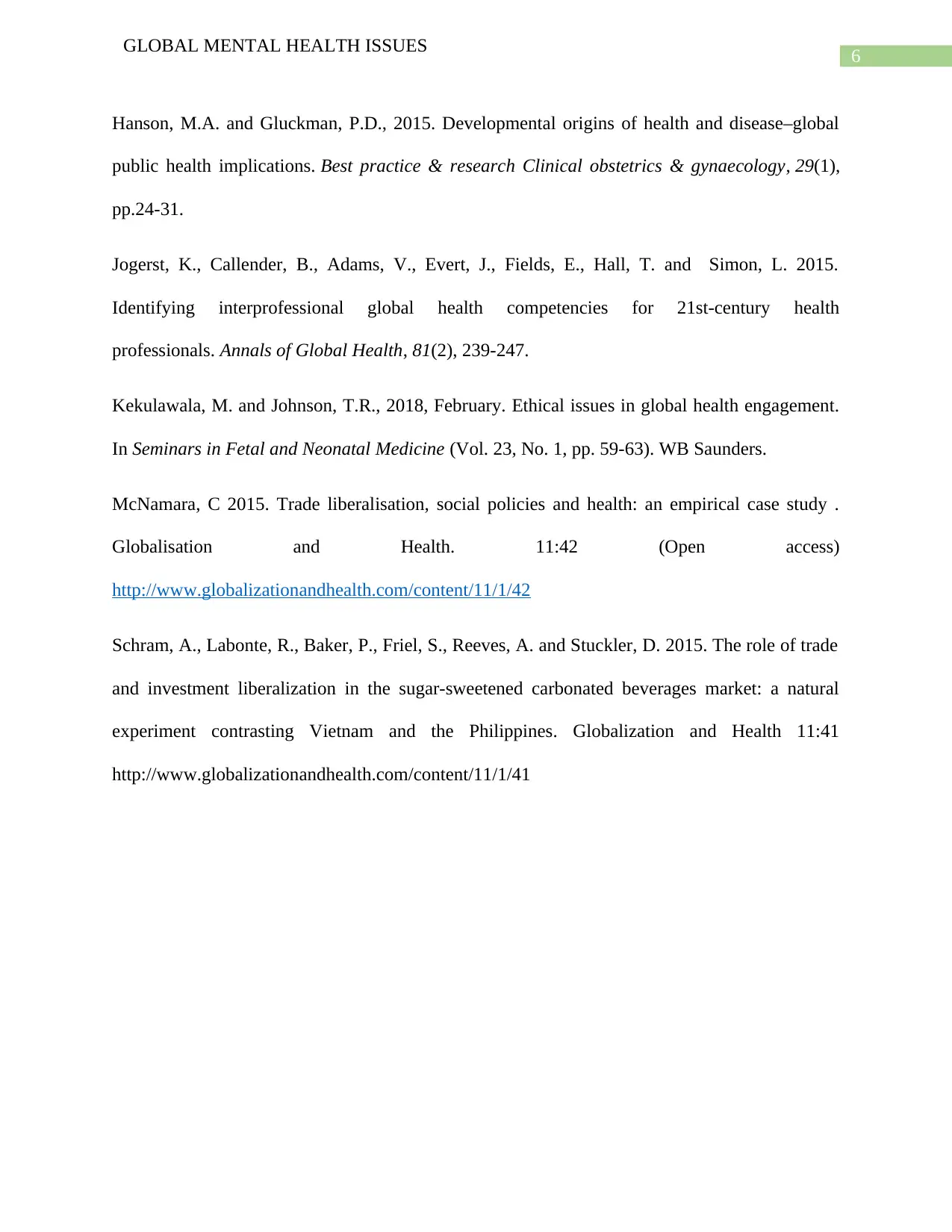
6
GLOBAL MENTAL HEALTH ISSUES
Hanson, M.A. and Gluckman, P.D., 2015. Developmental origins of health and disease–global
public health implications. Best practice & research Clinical obstetrics & gynaecology, 29(1),
pp.24-31.
Jogerst, K., Callender, B., Adams, V., Evert, J., Fields, E., Hall, T. and Simon, L. 2015.
Identifying interprofessional global health competencies for 21st-century health
professionals. Annals of Global Health, 81(2), 239-247.
Kekulawala, M. and Johnson, T.R., 2018, February. Ethical issues in global health engagement.
In Seminars in Fetal and Neonatal Medicine (Vol. 23, No. 1, pp. 59-63). WB Saunders.
McNamara, C 2015. Trade liberalisation, social policies and health: an empirical case study .
Globalisation and Health. 11:42 (Open access)
http://www.globalizationandhealth.com/content/11/1/42
Schram, A., Labonte, R., Baker, P., Friel, S., Reeves, A. and Stuckler, D. 2015. The role of trade
and investment liberalization in the sugar-sweetened carbonated beverages market: a natural
experiment contrasting Vietnam and the Philippines. Globalization and Health 11:41
http://www.globalizationandhealth.com/content/11/1/41
GLOBAL MENTAL HEALTH ISSUES
Hanson, M.A. and Gluckman, P.D., 2015. Developmental origins of health and disease–global
public health implications. Best practice & research Clinical obstetrics & gynaecology, 29(1),
pp.24-31.
Jogerst, K., Callender, B., Adams, V., Evert, J., Fields, E., Hall, T. and Simon, L. 2015.
Identifying interprofessional global health competencies for 21st-century health
professionals. Annals of Global Health, 81(2), 239-247.
Kekulawala, M. and Johnson, T.R., 2018, February. Ethical issues in global health engagement.
In Seminars in Fetal and Neonatal Medicine (Vol. 23, No. 1, pp. 59-63). WB Saunders.
McNamara, C 2015. Trade liberalisation, social policies and health: an empirical case study .
Globalisation and Health. 11:42 (Open access)
http://www.globalizationandhealth.com/content/11/1/42
Schram, A., Labonte, R., Baker, P., Friel, S., Reeves, A. and Stuckler, D. 2015. The role of trade
and investment liberalization in the sugar-sweetened carbonated beverages market: a natural
experiment contrasting Vietnam and the Philippines. Globalization and Health 11:41
http://www.globalizationandhealth.com/content/11/1/41
1 out of 7
Related Documents
Your All-in-One AI-Powered Toolkit for Academic Success.
+13062052269
info@desklib.com
Available 24*7 on WhatsApp / Email
![[object Object]](/_next/static/media/star-bottom.7253800d.svg)
Unlock your academic potential
Copyright © 2020–2026 A2Z Services. All Rights Reserved. Developed and managed by ZUCOL.





